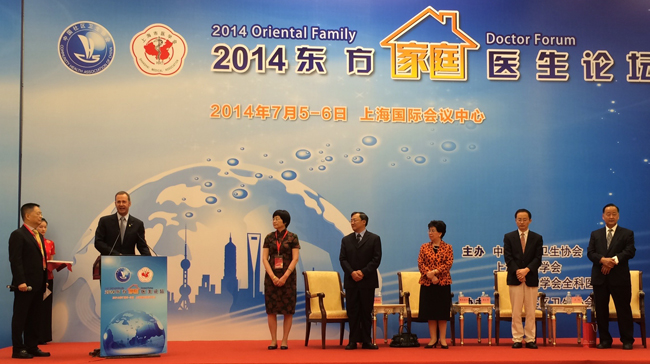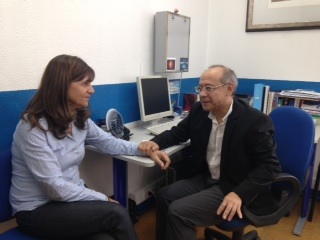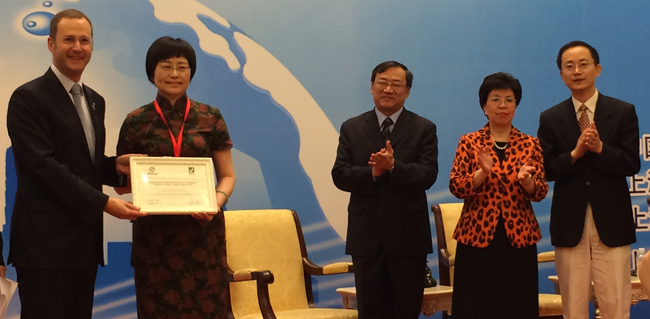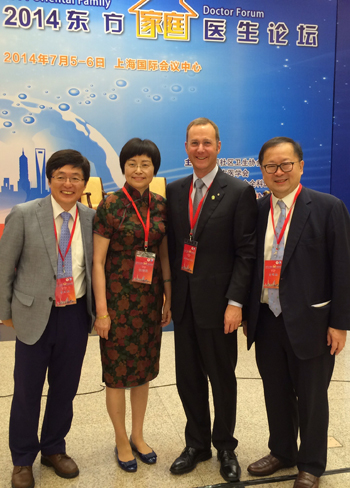From the President: Innovation in family medicine
 Photo: Accreditation ceremony in Shanghai
español
Photo: Accreditation ceremony in Shanghai
español

I was walking near my home in Sydney recently and I came across a statue of Prince Henry the Navigator. Henry was a 15th century Portuguese prince who was responsible for initiating the early development of Portuguese exploration and maritime trade and sponsored the search for new trade routes. Although the ships sponsored by Prince Henry probably never got as far as Australia, the Portuguese community in Sydney has had a statue erected in his honour as an innovative thinker who changed the world.
As family doctors we are also innovative thinkers, and, like Prince Henry, we have the ability to change the world through our work and our influence.
Over the past month I have had the opportunity to visit family doctors in Portugal and also in Ireland and to hear about the challenges they have faced in delivering care to their patients during times of fiscal crisis. Over recent years both countries have experienced reduced government financial support for health care in response to the need for austerity measures. Yet family doctors and the members of their teams in both countries have continued to deliver high quality primary care to their patients and their communities.
The Government of Ireland has recognized the fundamental importance of family medicine and has adopted the innovative approach of appointing a Minister for Primary Care dedicated to ensuring community-based health care access for every person in Ireland.

Portugal has an impressive network of primary care clinics with teams of health care workers led by specialist family doctors. Outreach community nursing teams work alongside family doctors to provide services to marginalized communities that would otherwise have no access to health care at all.
Photo: Dr Carlos Canhota and Dr Helena Febra at the Aces West Lisbon and Oeiras Health Centre (Agrupamento Centros de Saude)
One of the major areas of WONCA’s innovative work has been in mental health. Our work with the World Health Organization (WHO) is focusing attention in many countries on ways we can better integrate mental health into family medicine. The mental health impact of the financial crises and austerity measures has been a serious cause of concern for family doctors in Portugal, Ireland and other parts of Europe.
Professor Chris Dowrick from The University of Liverpool is a member of our WONCA mental health working party. Chris has recently described how primary care mental health is being squeezed between a rock and a hard place. “On the one hand mental health problems are increasing as a consequence of rising unemployment, poverty and debt; while on the other hand secondary mental health services are being scaled back as a result of government cuts - so primary care is left with an increased burden and reduced specialist support.”
These challenges for our patients also test our own resilience. While we continue to innovate within our practices within our communities to ensure that our patients receive the highest possible standards of care, it is critical that we also continue to innovate to find ways to support each other as well.
One of the great recent innovations of WONCA has been the development of young doctor movements. The Vasco da Gama Movement was started by young family doctors in Europe over a decade ago, and similar groups have since been established in the Asia Pacific, South Asia and South America. Over the last year we have seen members of our existing young doctor movements support the establishment of young family doctor movements in Africa and the Middle East, and just last month in North America. Thanks to the innovative thinking and leadership of WONCA’s younger members we now have young doctor movements in every region of the world.
Another important innovation has been the development of WONCA’s new global standards for postgraduate family medicine education. These standards, developed by our working party on education and endorsed by WONCA’s world council last year in Prague, provide a benchmark for those developing training programs for family doctors around the world. Early this month I was in China with the Director-General of the World Health Organization, Dr Margaret Chan, and together we made a presentation to the Shanghai Medical College of Fudan University, which became the first family doctor training program in the world to receive accreditation against WONCA’s Global Standards.
 Photo: WONCA President, Michael Kidd presenting to Prof Zhu Shanzhu, president of the Society of General Practice of the
Chinese Medical Association; in the presence of Dr Margaret Chan (second from right)
Photo: WONCA President, Michael Kidd presenting to Prof Zhu Shanzhu, president of the Society of General Practice of the
Chinese Medical Association; in the presence of Dr Margaret Chan (second from right)
China is one of the countries taking family medicine development seriously and it is extraordinary to see the innovations underway in that country. The Chinese Government recognizes that one of the biggest challenges is training the family doctor workforce to meet the needs of both urban and rural China. China has embarked on a massive drive to train and recruit up to 400,000 general practitioners in the next seven years in order to reform the country’s health system to meet the current and future needs of the pop

ulation, especially the 800,000,000 people living in rural areas. At the moment there are 85,000 specialist family doctors in training or recently graduated in China. The innovations underway in China should provide important lessons that will flow to many other parts of the world facing the same challenge of providing universal health coverage.
Photo (right): WONCA Asia Pacific region president, JK Lee; Prof Zhu Shanzhu, president of the Society of General Practice of the Chinese Medical Association; WONCA President, Michael Kidd; WONCA Executive member at large Donald Li.
Through innovations like these, family doctors working together have the power to transform our world for the better.
Michael Kidd
WONCA President